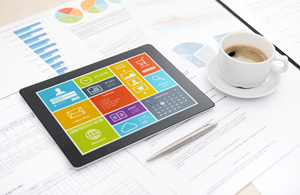For years, when deciding to replace a failed computer, or upgrade to something new, it was relatively simple to decide whether a laptop or desktop was the right option – you asked the question “do you require something portable?”
But with the surge in capability, range and popularity of portable devices over the last few years, it has become more of a point of discussion as to whether tablets are a feasible option as opposed to the more traditional desktops and laptops for your business.
Desktop and laptop options certainly come with more processing power than tablet devices, providing a wider range of usage, improved performance, and multitasking. From the perspective of functionality, even entry level desktops and laptops can do everything that a tablet can do, and more.
The improved power and resources now available in laptops have had a direct effect on battery life and the average lifetime on a full charge is less than half on a laptop than it is on a tablet. In addition, the battery life on a tablet extends into standby time, meaning in theory it can last days on a single charge.
The hard drive capacity in desktops and laptops far exceeds those available in tablets. These days, most entry level-desktops and laptops come with a minimum of 500GB and above, whereas high-end tablets only come with up to 128GB. The reasons for this are portability and weight, but with storage available via network drives, and an increase in cloud services, is storage on a device as much of a consideration for a business as it used to be?
Tablets are designed to be more portable than laptops; these typically come in screen sizes of 7″ to 10″, and often lack certain features of a laptop, such as a DVD drive and bigger capacity for data storage offered by larger hard drives. Laptops are also portable by design, but intended as a portable desktop. Screen sizes are larger, typically ranging from 13″ – 15″ and of course, the additional features available with a laptop come with additional weight, with these typically ranging from 1.5kg to over 2kg, as opposed to tablets, which are usually under 1kg in weight.
Windows, in its various forms, is still the most widely-used operating system in business desktops and laptops by some way. iOS is leading the way when it comes to tablet devices, with Android hot on its heels. Windows is also available on mobile devices, but has just 7.5% of market share to date.
To achieve productivity, you require applications (commonly known as “apps”), ranging from Microsoft Office to bespoke software designed to carry out a particular function in your business. There are a variety of ‘apps’ available for tablet devices, but when it comes to productivity, the options available for desktops and laptops offer far more than anything available for tablets.
When it comes to inputting information, people instantly think of the keyboard and mouse, which have been in use for years. However the rise of touch screen displays and tablets has introduced ‘touch’ as an alternative input method, highlighted with the changes Microsoft has made to Windows 8. Whilst docks and cases are available that incorporate a QWERTY keyboard for tablets, desktop and laptops provide a more comfortable experience, especially when having to type large amounts of data.
Of course, there is always the possibility that a change in requirement may mean that you need slightly more from your computer. There are relatively simple options for upgrade with desktop PCs and even laptops, if you require extra memory or storage space. However with a tablet option, besides those with an SD card slot for additional data, it is harder to carry out any hardware upgrades, as they have been packed extremely tightly to ensure they are as small as possible.
The final, and possibly one of the more important points of consideration, is cost. Typically, with the extra functionality and power that comes with a laptop or desktop comes a bigger price tag but there is a wide variety of both options available in varied price brackets, depending on the specification required.
So what’s the verdict – is a tablet a better option for a business than a desktop or laptop? There is no right or wrong answer to this question. The answer depends entirely upon the requirements of the end user and the business. But there are plenty of things to consider, to ensure you make the right purchase.
